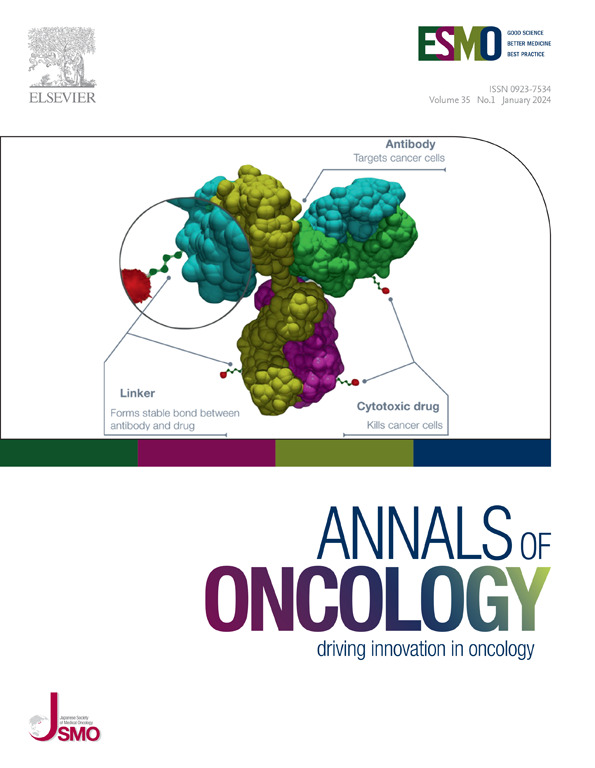ctDNA detection in cerebrospinal fluid and plasma and mutational concordance with the primary tumor in a multicenter prospective study of patients with glioma☆
IF 56.7
1区 医学
Q1 ONCOLOGY
引用次数: 0
Abstract
Background
Cerebrospinal fluid (CSF) stands as an easily accessible reservoir for circulating tumor DNA (ctDNA) analysis in patients with central nervous system (CNS) tumors, although evidence is still limited. Our aim was to prospectively evaluate the feasibility of detecting ctDNA for mutational analysis in CSF and plasma in patients with glioma.
Methods
This was a prospective study of patients with glioma diagnosed at four third-level hospitals in Spain. A customized next-generation sequencing (NGS) eight-gene panel (IDH1, IDH2, ATRX, TP53, PTEN, PIK3CA, EGFR, BRAF) was used in paired CSF, plasma and tumor samples. Mutation concordance occurred when the same pathogenic gene variant was detected in tumor and ctDNA. The prognostic value of ctDNA and that of its median variant allele frequency (mVAF) were analyzed.
Results
Between February 2017 and March 2020, 37 patients with glioma were enrolled. The 32 patients with analyzable CSF samples comprised patients with new diagnosis (n = 23) and relapse (n = 9); World Health Organization fifth Edition types: IDH-mutant astrocytoma (n = 10), IDH-mutant oligodendroglioma (n = 6) and IDH-wildtype glioblastoma (n = 16); CSF-ctDNA-positive: 19/32 (59%); and CSF-ctDNA-negative: 13/32 (41%). CSF mutation numbers were 1 (10/19), 2 (7/19) and 3 (2/19). Frequencies of CSF-ctDNA-mutated genes were EGFR (8/19, 42%), PTEN (7/19, 37%), TP53 (6/19, 32%), IDH1 (5/19, 26%) and PIK3CA (4/19, 21%). Tumor–CSF mutation concordance was found in 16/19 (84%). Progression-free and overall survival were significantly shorter in ctDNA-positive patients with VAF equal to or greater than the mVAF compared with ctDNA-positive patients with VAF lower than the mVAF. No association was found between ctDNA in CSF and distance to closest CSF reservoir, tumor size or IDH status. ctDNA was detected in 2 of 14 (14%) individual plasma samples, in both cases concordant with the primary tumor.
Conclusion
CSF is a reliable reservoir for ctDNA analyses in patients with glioma. ctDNA is detectable in plasma although at a lower rate. Larger, prospective studies should be conducted to refine the potential role of liquid biopsy in this disease.
脑胶质瘤患者多中心前瞻性研究中脑脊液和血浆ctDNA检测与原发肿瘤的突变一致性
背景:脑脊液(CSF)是中枢神经系统肿瘤患者循环肿瘤DNA (ctDNA)分析的一个容易获取的储存库,尽管证据仍然有限。我们的目的是前瞻性评估检测ctDNA用于脑胶质瘤患者脑脊液和血浆突变分析的可行性。方法:对西班牙四家三级医院诊断的胶质瘤患者进行前瞻性研究。定制的下一代测序(NGS) 8基因面板(IDH1, IDH2, ATRX, TP53, PTEN, PIK3CA, EGFR, BRAF)用于配对的CSF,血浆和肿瘤样本。当在肿瘤和ctDNA中检测到相同的致病基因变异时,发生突变一致性。分析ctDNA及其中位变异等位基因频率(mVAF)的预后价值。结果:在2017年2月至2020年3月期间,纳入了37例胶质瘤患者。在32例可分析CSF样本的患者中:新诊断(n=23);复发(n = 9)。WHO第5版:idh -突变星形细胞瘤(n=10), idh -突变少突胶质细胞瘤(n=6), idh -野生型胶质母细胞瘤(n=16)。csf -ctDNA阳性(ctDNA+): 19/32(59%)。csf -ctDNA阴性(ctDNA-): 13/32(41%)。否。脑脊液突变:1(10/19),2(7/19),3(2/19)。CSF-ctDNA突变基因频率:EGFR(8/19: 42%)、PTEN(7/19: 37%)、TP53(6/19: 32%)、IDH1(5/19: 26%)、PIK3CA(4/19: 21%)。肿瘤-脑脊液突变一致性:16/19(84%)。与ctDNA+ < mVAF相比,ctDNA+≥mVAF患者的无进展生存期和总生存期显著缩短。脑脊液中ctDNA与最近脑脊液储存库的距离、肿瘤大小或IDH状态没有关联。14例个体血浆样本中有2例(14%)检测到ctDNA,这两例与原发肿瘤一致。结论:脑脊液是脑胶质瘤患者ctDNA分析的可靠储存库。血浆中可以检测到ctDNA,但检测率较低。应该进行更大规模的前瞻性研究,以完善液体活检在这种疾病中的潜在作用。
本文章由计算机程序翻译,如有差异,请以英文原文为准。
求助全文
约1分钟内获得全文
求助全文
来源期刊

Annals of Oncology
医学-肿瘤学
CiteScore
63.90
自引率
1.00%
发文量
3712
审稿时长
2-3 weeks
期刊介绍:
Annals of Oncology, the official journal of the European Society for Medical Oncology and the Japanese Society of Medical Oncology, offers rapid and efficient peer-reviewed publications on innovative cancer treatments and translational research in oncology and precision medicine.
The journal primarily focuses on areas such as systemic anticancer therapy, with a specific emphasis on molecular targeted agents and new immune therapies. We also welcome randomized trials, including negative results, as well as top-level guidelines. Additionally, we encourage submissions in emerging fields that are crucial to personalized medicine, such as molecular pathology, bioinformatics, modern statistics, and biotechnologies. Manuscripts related to radiotherapy, surgery, and pediatrics will be considered if they demonstrate a clear interaction with any of the aforementioned fields or if they present groundbreaking findings.
Our international editorial board comprises renowned experts who are leaders in their respective fields. Through Annals of Oncology, we strive to provide the most effective communication on the dynamic and ever-evolving global oncology landscape.
 求助内容:
求助内容: 应助结果提醒方式:
应助结果提醒方式:


